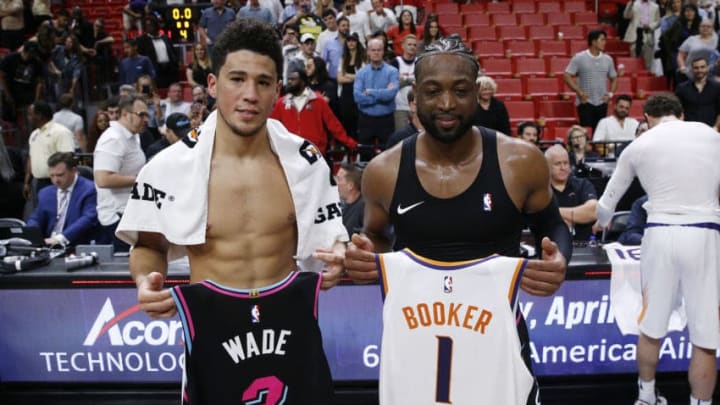
Career-Highs
Unfortunately for Brandon Roy, his fourth season was also his last full season in his career, as his knees began to break down that season, causing him to miss almost half of the following year, then retiring for a season before making a brief five game re-appearance with the Minnesota Timberwolves in what should have still been the prime of his career and only his seventh season in the league.
His third season was his best scoring season overall where he averaged 20+ points for the first time at 22.6 per game, while he averaged a career-high 5.8 assists in his second season, and 4.7 caroms in both his second and third years.
Throughout those four years he remained very consistent as a shooter, averaging 45.6%, 45.4%, a career-high 48.0%, then 47.3% from the field, his third season shooting 37.7% from beyond the arc, albeit at 2.8 attempts per game, his third highest, with 3.4 per game his fourth season setting his high mark.
Like Wade, Roy was an All-Star in his second, third, and fourth seasons, his fourth year being 2010, the year he also faced off against the Phoenix Suns in the first round of the playoffs, upsetting them in game one, although Phoenix ultimately outlasting the upstart (and seemingly on the rise) Blazers in six games.
While it is hard to say that Roy was “running the league” by this point in his career, nobody would have ever predicted that four seasons would have been as far as Roy would ever get, and what he could have done with his career if his body had kept up with his mind.

Phoenix Suns
Dwayne Wade, on the other hand, could easily say he was “running the league” through only four seasons, having already averaged a minimum of 27 points per game twice (27.2 his third season and 27.4 in his fourth year), dishing out 6.8, 6.7, and a career-high 7.5 assists per game in his second, third, and fourth years, while also grabbing a career-high (to that point) 5.7 rebounds per game in his third season.
Wade, never really an outside shooter as noted before, shot an outstanding 50.2% eFG% by his fourth season, which he would not eclipse until his sixth year in the league, but would do so four additional times in his prime.
As we all know, Booker has averaged over 20 points per game in each of his last three seasons, averaging career-highs each year of his career thus far including 24.9 and 26.6 points per game (the second highest in franchise history) his last two seasons.
Having only played with a decent point guard his first two seasons in the league, he has had to play a lot of point since, and has raised his assists per game average in each of his four years, including 6.8 last season, right at where Wade averaged in his second and third seasons.
Never much of a rebounder, Book’s career-high is 4.5 per game in his third season, again, I believe, attributed to the lack of a dedicated running offense ever since the Phoenix Suns drafted him. To think that he couldn’t average closer to 7-8 per game if Monty Williams did implement a fast-paced offense (an average that really doesn’t seem all that out of the realm of possibility especially considering his height).
Book’s eFG% too has eclipsed 50% already in his career, sitting at 52.1% last season, a rate that Wade would not pass until his eighth season in the league, and would only do so on three occasions (maxing out at 55.1% in his 11th season).
One final stat that I do want to reference (and will include Kobe Bryant in) is Offensive Rating, an advanced metric that calculates the estimated number of points a player produces (via points and assists) per 100 possessions.
Through four seasons, Brandon Roy had an average of 117, easily the highest of these four players. Dwyane Wade averaged 110 with Kobe Bryant not far behind at 108 and Booker bringing up the rear with an average of 105 over his first four seasons.
My only thought on that? Get Booker a point guard, place him in an offense that takes advantage of the young roster’s speed, and I bet anything that Book’s Offensive Rating numbers spike up considerably.
